Convert Mbps to kbps download speed: An Ultimate Guide [UPDATED]
How to convert Mbps to kbps download speed?
Well, accessing the Internet with fast or slow speed depends on the transmission speed of the network.
Today, we will introduce you to two common units that represent network access speed: Mbps and kbps.
So, what are Mbps and kbps?
Find the best answers in this article!
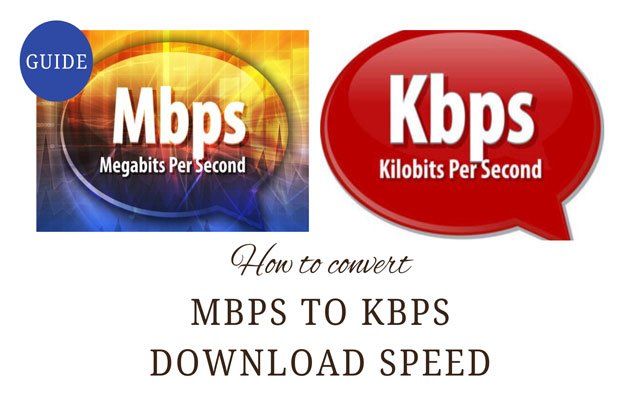
Convert Mbps to kbps download speed
Mbps vs kbps
In the first part of today’s post, let’s get some basics of Mbps and kbps.
What is Mbps?
Mbps is an acronym for the English word Megabits per second, a unit of measurement of Internet speed.
Each megabit equals 1 million bits.
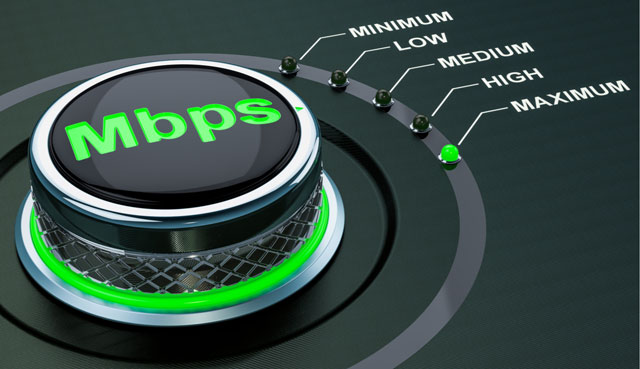
What is Mbps?
Well, Mbps just informs you of how quickly downloads occur on their service if an ISP advertises download speeds of 100 Mbps.
Technically speaking, MBps (megabytes per second) rather than Mbps can be used to assess Internet speed.
However, Mbps is still, by a wide margin, the most popular choice across the sector. It is, in essence, a standard.
What is kbps?
kbps is short for Kilobit per second, a unit of measurement for the transmission rate of data in telecommunications.
In simple terms, kbps represents the number of bits transmitted per second.
Dial-up modems, for example, were graded according to their maximum download rates, which ranged from 14.4, 28.8, and 56 kbps.
kbps was the typical way to measure data transmission dates throughout the 1990s and early 2000s.
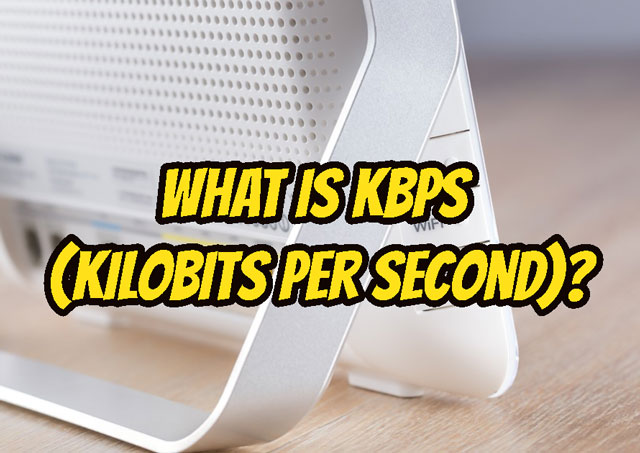
What is kbps?
Broadband connections like cable and DSL, on the other hand, currently offer speeds of several megabits per second.
As a result, Mbps is more widely used than kbps.
1 Mbps = 1000 kbps
1 Byte = 8 bits
What is the difference between Mbps and kbps?
For short, the difference is only in magnitude.
A 1 Mbps connection has 1,000 times greater capacity than a 1 kbps connection.
Technically speaking, network speed or connection speed is an inaccurate term for network capacity, also known as bandwidth.
A network with a 1 kbps capacity can send 1 kbit per second of data.
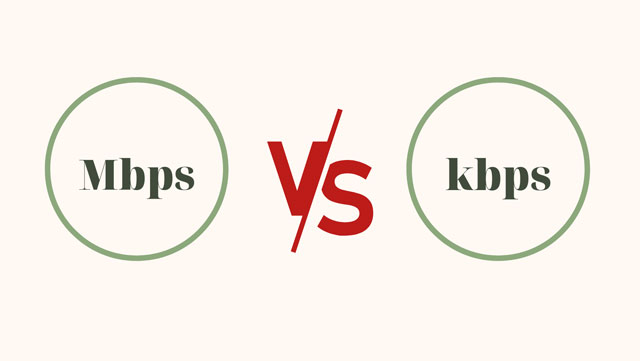
Mbps and kbps are different in magnitude
Both units are used for the same thing, but one is more appropriate for low network capacities.
For example, a 2G mobile network with a capacity of 50 kbit/s (really 40 kbit/s) is easier to write as kbps than as 0.05 Mbps.
Additionally, it results in better headlines for ads and banners.
The majority of contemporary network definitions utilize Mbps or mbit/s.
Mbps to kbps
To know the conversion of Mbps to kbps as well as other measurements, look at the picture below:
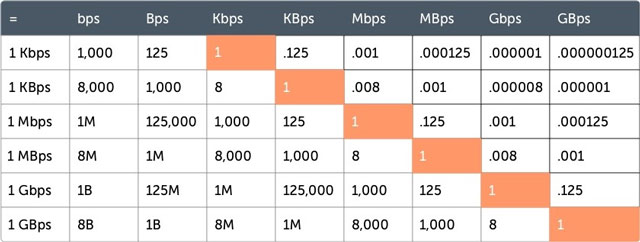
Conversion table
Unit less than Mbps is kilobits per second (kbps).
This represents a rate of 1000 bits/second.
The larger unit of Mbps is Gbps (gigabits per second) - the average speed is 1 billion/second.
One megabit equals 1 million binary pulses or 1,000,000 pulses (bits).
See also: What is a fast download speed Mbps?
How to convert Mbps to kbps download speed?
Reading the previous part, you’ll clearly know that 1.0 Mbps is 1,000 times faster than 1.0 kbps.
But how can you convert 2.5 Mbps to kbps and vice versa?
Simply thought, there are 2 ways to convert Mbps to kbps download speed:
Use a conversion converter
The first way is using a conversion converter to convert Mbps to kbps download speed.
Consider this website gbmb.org.
This is a basic web tool that may be used to convert megabits per second to kilobits per second in a variety of situations.
To use it, just enter the figure in megabits per second (Mbps) to convert to kilobytes per second to begin your conversion (kbps).
Look at this example:
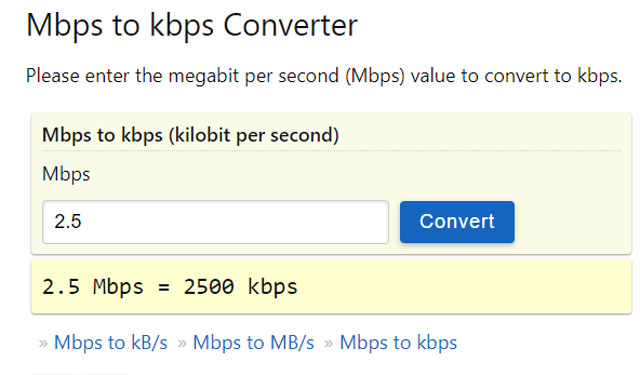
The first method
So easy, right?
However, in case you are off-line and can’t visit this website, go another way.
Also read: What is a good download speed?
Calculate
The second simple way is, simply to multiply the number of mbit/s by 1,000 to convert from Mbps to kbps.
The decimal point can be moved three positions to the left in the download speed calculator Mbps.
Let's say you have a 10 megabit per second connection and want to know how many kbps it is.
All you have to do is multiply 10 by 1,000 to get 10,000 kbps.
A step-by-step calculation, as well as a kbit/s to mbit/s conversion table, are provided below.
-
1 Megabit/sec = 1000 kilobits/sec.
-
Mbps: Megabit per second (Mbit/s or Mb/s)
-
kbps: kilobit per second (kbit/s or kb/s)
-
1 megabit = 10002 bits
-
1 kilobit = 10001 bits
-
1 megabit = 1000 kilobits
-
1 megabit/second = 1000 kilobits/second
-
1 Mbps = 1000 kbps
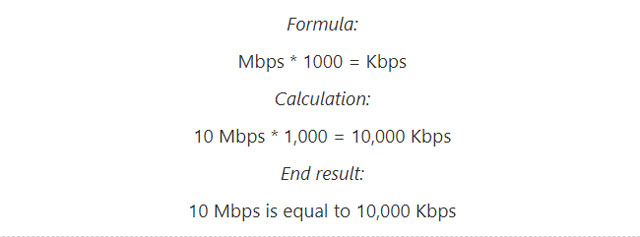
Convert 10 Mbps to Kbps
With 1 Mbps, you hardly get anything done!
Web pages hardly ever load quickly enough, let alone use a video call or stream Netflix!
kB/s (or kBps) stands for Kilobytes.
This unit is used to quantify the speed at which data is transferred using decimal multiples of bits.
Generally speaking: 1 Mbps = 125 kB/s
Vice versa: 1 kB/s = 0.008 Mbps
Refer to the formula mentioned above:
1 Mbps = 125 kB/s 1 kB/s = 0.008 Mbps |
So, 10 Mbps equals 1,250 kB/s.
Wrapping up
Now, we are done! That’s the end of today’s post with a lot of interesting information on convert Mbps to kbps download speed. Hope you like it. Also, check out our further post “download speed calculator Mbps.”
![Why is my download speed so SLOW but upload FAST: 3+ causes [Updated]](https://gospeedcheck.com/filemanager/data-images/Why-is-my-download-speed-so-slow-but-upload-fast_1.jpg)
![Why is my Xbox download speed so slow? 5 little-known reasons [SOLVED]](https://gospeedcheck.com/filemanager/data-images/Why-is-my-Xbox-download-speed-so-slow_1.jpg)
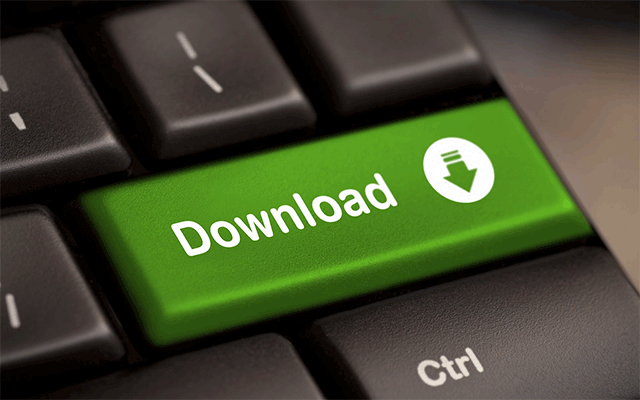


4 Comments
Christopher Miller
What is the difference between Mbps & MBps?
Leave a Comment
Your email address will not be published. Required fields are marked *MySpeed
MB stands for Megabyte and is used for file size. Mb stands for Megabit and is used for download and upload speed
Leave a Comment
Your email address will not be published. Required fields are marked *Juan Houston
How fast is 128 kbps speed on a smartphone?
Leave a Comment
Your email address will not be published. Required fields are marked *MySpeed
You can browse the web with acceptable speed using opera mini, listen to music on Spotify, send & read mails, and others
Leave a Comment
Your email address will not be published. Required fields are marked *Leave a Comment
Your email address will not be published. Required fields are marked *